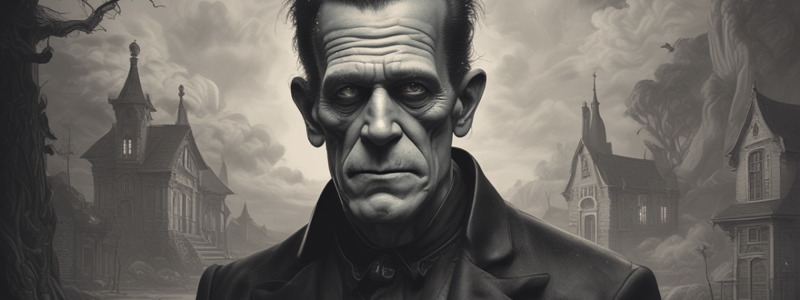Podcast
Questions and Answers
Who is the protagonist of the novel?
Who is the protagonist of the novel?
- Robert Walton
- The Monster
- Henry Clerval
- Victor Frankenstein (correct)
What is the main theme explored in the novel?
What is the main theme explored in the novel?
- The dangers of unchecked ambition and the pursuit of knowledge (correct)
- The power of love and friendship
- The role of women in society
- The importance of social class and wealth
What is the name of Frankenstein's adopted sister and fiancée?
What is the name of Frankenstein's adopted sister and fiancée?
- Margaret Saville
- Justine Moritz
- Elizabeth Lavenza (correct)
- Agatha De Lacey
What is the literary significance of the novel?
What is the literary significance of the novel?
What is the name of the explorer who discovers Frankenstein's dying body?
What is the name of the explorer who discovers Frankenstein's dying body?
What is the mythological reference in the novel?
What is the mythological reference in the novel?
What is the historical context in which the novel was written?
What is the historical context in which the novel was written?
What is the nature of the monster created by Frankenstein?
What is the nature of the monster created by Frankenstein?
Flashcards are hidden until you start studying
Study Notes
Author and Publication
- Written by Mary Shelley
- Published in 1818
- First edition was anonymous, with Shelley's name being added in the second edition in 1823
Plot Summary
- The story revolves around Victor Frankenstein, a young scientist who creates a monster from dead body parts
- The monster, who is intelligent and capable of emotions, is rejected by its creator and seeks revenge
- The novel explores the consequences of playing God and the nature of humanity
Main Characters
- Victor Frankenstein: The protagonist, a young scientist who creates the monster
- The Monster: The creature created by Frankenstein, who seeks revenge against its creator
- Robert Walton: An explorer who discovers Frankenstein's dying body and hears his story
- Elizabeth Lavenza: Frankenstein's adopted sister and fiancée
- Henry Clerval: Frankenstein's friend and university roommate
- Justine Moritz: A family servant who is falsely accused of murder
Themes
- The dangers of unchecked ambition and the pursuit of knowledge
- The nature of humanity and what makes us human
- The consequences of playing God and tampering with nature
- The destructive power of revenge and the cycle of violence
Literary Significance
- Considered one of the first science fiction novels
- Explores the Romantic idea of the sublime and the beauty of nature
- Influenced the development of the horror genre
- Has been adapted countless times for film, stage, and other media
Historical Context
- Written during the Industrial Revolution, when there were concerns about the impact of technology on society
- Reflects the fears and anxieties of the time, including the rise of science and the decline of traditional values
- Draws on the myth of Prometheus, who defied the gods by stealing fire and giving it to humanity
Author and Publication
- Mary Shelley is the author of the novel
- Published in 1818, initially anonymously, with her name added in the second edition in 1823
Plot Summary
- The story centers around Victor Frankenstein, a young scientist who creates a monster from dead body parts
- The monster, intelligent and capable of emotions, seeks revenge against its creator after being rejected
Main Characters
- Victor Frankenstein: The protagonist, a young scientist who creates the monster
- The Monster: The creature created by Frankenstein, seeking revenge against its creator
- Robert Walton: An explorer who discovers Frankenstein's dying body and hears his story
- Elizabeth Lavenza: Frankenstein's adopted sister and fiancée
- Henry Clerval: Frankenstein's friend and university roommate
- Justine Moritz: A family servant falsely accused of murder
Themes
- Dangers of unchecked ambition and pursuit of knowledge
- Nature of humanity and what makes us human
- Consequences of playing God and tampering with nature
- Destructive power of revenge and the cycle of violence
Literary Significance
- Considered one of the first science fiction novels
- Explores the Romantic idea of the sublime and the beauty of nature
- Influenced the development of the horror genre
- Adapted countless times for film, stage, and other media
Historical Context
- Written during the Industrial Revolution, reflecting concerns about technology's impact on society
- Reflects fears and anxieties of the time, including the rise of science and decline of traditional values
- Draws on the myth of Prometheus, who defied the gods by stealing fire and giving it to humanity
Studying That Suits You
Use AI to generate personalized quizzes and flashcards to suit your learning preferences.




